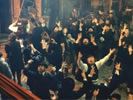Eye For Film >> Movies >> The Hourglass Sanatorium (1973) Film Review

The dream/nightmare/acid trip scenario has more or less eluded filmmakers and consistently turned off audiences. In a world in which anything goes and nothing is real, you might as well glide through a Chagall painting for all the sense you are going to make of it.
By using words such as “surreal”, it is possible to elevate incomprehension to a higher plain. Storytelling becomes an abstract art form. The death of logic sets imagination free. The light at the end of the tunnel is the hope that rings eternal. Make up your own sound bites, the more pretentious the better.

Jozef (Jan Nowicki) comes to the sanatorium to visit his father Jakup (Tadeusz Kondrat). He is taken into a room where a white haired old man lies in bed. During his search of this dilapidated, empty building, surrounded by an overgrown garden in the middle of desolate country, he had been told by the first person he met, a sexy young nurse in uniform (Janina Sokolowska), “They’re always asleep here, didn’t you know? Besides it’s never night time here.”
Already, you know you are lost.
“Is my father alive?”
The doctor (Gustaw Holoubek) talks garbage about manipulating time, implying that death is an obstacle, avoided by nudging the present into a muddled past.
Jakup is dead and then he’s alive. In the known world, where you imagine Jozef comes from, Jakup and his mother (Irene Orska) were merchants. They had a shop. Now, in this ruined mansion, Jews dance and sing, prostitutes laugh and expose their nipples, a boy in a sailor suit learns about elsewhere through his stamp collection, an hysterical girl (Bozena Adamek) is preparing to be seduced, mechanical men dressed as cavalry officers decorate a room, while negro soldiers with bayonets are hunting deserters, one of whom may be Jozef. Parrots, people and toys die. The Three Wise Men put in an appearance. Live hens and stuffed dogs have roles to play. Everywhere is chaos and cobwebs. Jozef’s mother treats him like a child (“You’re a naughty boy!”). The nightmare will not end, until thankfully, blissfully, the madness retreats and the lights go out.
In the Seventies, films like this had the status of arthouse. Their photography was praised (rightly in this case) and their obscurity respected. Now that CGI is sexier than life and you are only a multiplex away from Action City, they look like leftovers from an intellectual’s doodle.
Reviewed on: 17 Nov 2008



















